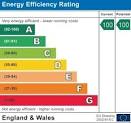Domestic EPC Explained
The Energy Performance Certificate (EPC) is designed to make it easy for anyone to compare the energy efficiency of different domestic dwellings.
They are also used to access various different types of funding that are designed to finance the installation of energy saving measures and renewable technologies.
Who needs an EPC?
There are several reasons why you may require an EPC. Each of these is described in detail further below:
- Sale or rental of domestic property
- For solar PV Feed in Tariff (FIT) applications
What makes an EPC?
EPCs are designed to allow a comparison of the energy efficiency across a range of different properties.
For assessment takes into account:
- The fabric of the building
- How the space is heated
- How the water is heated
- The fixed lighting
- Any renewable technologies installed
The survey does not look at the way the occupants of a building actually use energy on a day to day basis, but instead a standard model of occupancy is used, based on the size of the building.
This allows buildings energy efficiency ratings to be compared without the results being skewed by unusual patterns of energy use.
This makes the EPC a great tool for comparing the efficiency of different buildings, but does mean that the estimated figures for annual energy consumption may vary from the actual energy consumption figures, particularly when a property has more or less occupants than is usual for a building of that size.
The Survey Process:
An EPC survey takes approximately 1 hour for a standard 3 bed property. Larger and more complex properties will of course take longer to survey. The EPC assessor will need access to each room of the property, and will be taking notes and photographs of the way the property is constructed, the insulation, the space and water heating, the lighting and any renewable technologies installed.
Once the assessor has carried out the site survey they will need to process the data they have collected on Government approved software. The software uses something called the Reduced Data Standard Assessment Procedure (RdSAP) to calculate the EPC rating from the data gathered. Once the EPC has been calculated it is lodged on the central Government register.

